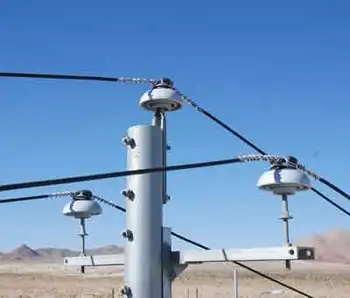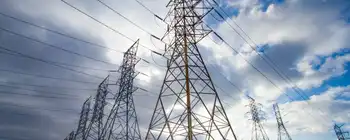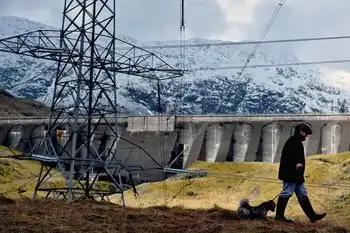Energy Bill Would Let Electric Industry Set Rules for Grid
WASHINGTON — - WASHINGTON — The Republican draft of the energy bill released recently would, for the first time, let the electric industry set mandatory rules for using its transmission grid, subject to government approval.
The idea has long enjoyed wide support in Congress. But lawmakers have either set it aside because of more pressing issues or have attached it to larger energy bills that failed because they contained so many controversial provisions. That could happen again this year, although these mandatory standards gained new support after the Aug. 14 blackout.
The system already operates under voluntary rules that cover various issues. These include what kind of fluctuations are permissible in voltage, which is a characteristic of electricity akin to pressure in a water pipe. The rules also regulate the frequency of the voltage, a measure of how fast the current alternates.
Other standards cover areas like how much of the grid can be used at any given time.
One question raised by the blackout is whether the rules are adequate when power plants or power lines are disconnected. If they are disconnected prematurely, that could allow a minor electrical problem to cascade across the entire system.
Investigators of the blackout will not say yet whether violations of such rules played a part in leaving millions of people without electricity.
In an effort to set standards for the industry, the bill that was agreed to by the chairmen of the House and Senate energy committees would give the Federal Energy Regulatory Commission the authority to create a national group that would draft rules and submit them to the commission.
The bill does not say so explicitly, but this new national group — the Electric Reliability Organization — would actually be the North American Electric Reliability Council of Princeton, N.J., known as NERC. It was created after the 1965 blackout in the Northeast and sets the standards that are now voluntary. Nerc also provided much of the expertise for the investigation into this year's blackout, which the Energy Department is planning to reveal, in part, soon. David R. Nevius, senior vice president of NERC, said in a telephone interview that the language in the bill, which his organization had discussed extensively with Congress, meant that the Federal Energy Regulatory Commission would approve the standards or send them back to Nerc for more work. But the commission, which is part of the Department of Energy, could not change the rules.
"They cannot rewrite them if they don't like them, they can remand them," Mr. Nevius said. The reason is that Nerc is a North American organization, integrating the power systems of Canada and the United States, and the United States government cannot write rules for the Canadian system, he said. Instead, Nerc could ask Canada and Mexico to enforce its rules in their countries, he said.
In electrical terms, the Canada-United States border is no different than the border between utility companies or regional power organizations. The Canadian authorities have said that they, too, are considering mandatory standards.
If the new rules are violated, penalties could range from letters of reprimand to fines, depending on how severe the violations are and how often they occur.
Related News

Frustration Mounts as Houston's Power Outage Extends
TEXAS - Houston is enduring significant frustration and hardship as a power outage stretches into its fourth day amid a sweltering heatwave. The extended blackout has exacerbated the challenges faced by residents in one of the nation’s largest and most dynamic cities, underscoring the critical need for reliable infrastructure and effective emergency response systems.
The power outage began early in the week, coinciding with a severe heatwave that has driven temperatures to dangerous levels. With the city experiencing some of the highest temperatures of the year, the lack of electricity has left residents without essential cooling, contributing to widespread discomfort…




